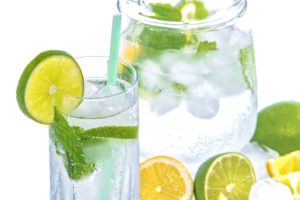
It seems as though we are on an endless search for the secrets to better health. We are willing to pay through the teeth for acai and goji berries and put turmeric into every meal and drink we can think of, while there is something freely available, used since the beginning of time, with more health benefits than any herb or extract.
The ancient secret? Water.
The importance of staying hydrated is often underestimated and up to 80% of Australians don’t drink enough water each day. Our bodies are made up of between 50-80% water and while we can survive for weeks without food, we can only last a few days without water.
Staying well hydrated has health benefits on many different functions in our body. Drinking enough water helps to:
- Maximise our physical performance by ensuring good body temperature control and preventing decreased motivation and physical and mental fatigue
- Facilitate weight loss by increasing your satiety and boosting your metabolism
- Improves concentration, brain function and mood – studies suggest that fluid loss of less than 2% can lead to impaired concentration, memory, and increased feelings of anxiety and fatigue
- Improve our complexion and skin health
- Carry oxygen and nutrients to the cells in our body and ensures our blood is liquid enough to flow through our vessels – if our cells are not adequately hydrated, this can affect our immune system leaving us susceptible to illness
- Protects our joints, tissues and spinal cord
- Improve waste removal through the kidneys, liver, intestinal tract and bladder, preventing kidney stones, UTIs and constipation
- Just generally keep us alive…
And the list goes on…
Other liquids such as soft drinks, alcohol and even tea and coffee can actually pump water out of our system and for this reason it is best to limits the amounts of these other liquids.
Some say that the general rule of thumb is that men should drink 2.6 litres per day, and women 2.1 litres, however these are based on the average man or woman and there are other factors to consider including your age, weight, physical exercise and whether you live in a hotter climate.
While a rare occurrence, it is also important to note that you can over-do it on the water front. Hyponatremia, or abnormally low sodium in the blood stream, can occur when too much water is either consumed or lost, lowering sodium levels. It can lead to nausea, confusion, and swelling of the brain and can require hospitalisation. This is rare in the general population but can occur in endurance athletes, those with some mental disorders such as schizophrenia and use of the drug ecstasy.



